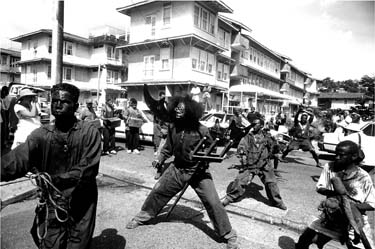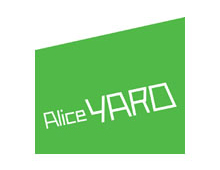Help Jeffrey Chock

Paramin blue devils in Port of Spain, Carnival Friday traditional parade, 1999, by Jeffrey Chock
Jeffrey Chock is one of Trinidad and Tobago's leading contemporary photographers. He is particularly well known for his work documenting Trinidad Carnival, theatre, and dance over the past three decades. Jeffrey's images are a crucial part of the Caribbean's cultural history, and his personal and professional knowledge of Trinidad's Carnival and performing arts is immense and irreplaceable.
Reviewing Chock's book Trinidad Carnival in the August 2006 CRB, Mark Lyndersay wrote: "His passion and intuitive understanding of the humanity that fuels the festival shine on every page." Philip Sander's review in the July/August 2006 Caribbean Beat said: "Spontaneous yet deliberate, finding the eerie in the pretty and the beautiful in the debased, and filled with faces transfigured by an emotion far more complicated than mere joy, the best of Chock’s photos are Carnival."
There are performing artists in Trinidad who will let no one but Jeffrey photograph their work. They understand his deep respect for them, and his devotion to his art. Jeffrey has inspired two generations of artists, and helped ensure their work will live on, though his photographs.
Now he needs help. Jeffrey recently suffered a major heart attack and was subsequently diagnosed with a series of medical problems requiring urgent--and expensive--intervention. Like many creative professionals in the Caribbean who have put art before income, he does not have health insurance to help in this time of crisis. It says a great deal about the affection and admiration that Trinidad's artistic community feels for him that various spontaneous initiatives have been launched to raise money to cover his medical bills. In coming weeks, there will be fundraising events of several kinds, and I will keep Antilles readers informed about these as they are announced.
Meanwhile, there are major medical bills already waiting to be paid, and Jeffrey needs cash right away. Georgia Popplewell has jump-started the fundraising process by setting up a ChipIn account, through which anyone with a credit card can make an immediate donation online--simply click on this widget:
As I write this, various well-wishers have already donated US$2,615, more than twenty per cent of the initial target of US$12,000. Donating is simple, safe--ChipIn uses PayPal's secure servers to received payments--and immediate. I urge all Antilles readers to consider making a donation, even a small one--to urgently support not just the work but the life of an important Caribbean artist.
Also:
- If you are a member of Facebook, join the Friends of Jeffrey Chock group to keep informed about fundraising efforts.
- Read a message from Jeffrey at Caribbean Free Radio, in which he explains the status of his health.
- If you would like to donate but don't have a credit card or don't feel comfortable using ChipIn, contact me directly at crb AT meppublishers DOT com (you know what to do with the AT and the DOT) and we'll arrange something.
- Finally, please forward this information to anyone who may be willing to help.







